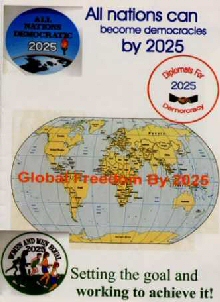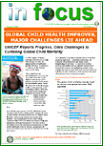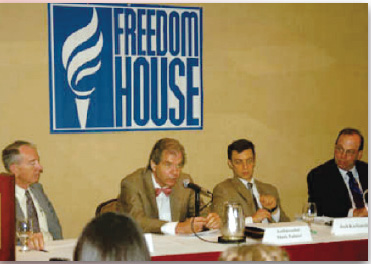|
Global Good Health Through Global Democracy by 2025
 We at CECHE have come to the conclusion that there is an inextricable link between honest and clear communications, better health and a clean environment-CECHE's founding, core objectives-and the growth of democracy and human rights. As Nobel Prize economist and Cambridge University professor Amartya Sen found in his research, no democracy has ever experienced a famine. The American Public Health Association (APHA)'s International Human Rights Committee has drafted a set of "Principles of Public Health and Human Rights" and is working to bridge the gap between public health and human rights. Key among the issues linking health and human rights is the universal and equal right to good health and access to good health care - rights that are often denied to women and children in certain developing nations. CECHE commends APHA's foresight and while endorsing APHA's principle has added a new operational dimension - working to encourage democracy on a global scale. (Click here to download a PDF version of this brochure Start Up Our first venture, begun in 1999 under the leadership of CECHE Vice Chairman Mark Palmer, was to help conceive, organize and participate in history's first meetings of all the world's democratic governments and democratic non-governmental organizations. Held in Warsaw on June 25-28, 2000, the meetings provided CECHE the venue to produce and disseminate over one thousand brochures and buttons designed to promote universal democracy by the year 2025. On June 30, 2000, The Wall Street Journal noted that CECHE Vice Chairman Mark Palmer "was one of the architects of the first global conference to promote worldwide democracy." Recent democratic breakthroughs in Mexico, Yugoslavia and Kenya, and for the first time serious discussions and movement towards democracy in the Middle East encourage us to persevere. 2002 and Beyond The second meeting of the world's democracies and democrats took place in Seoul, South Korea in November, 2002 and endorsed an action agenda with particular emphasis on regional cooperation in Asia, Africa and the Middle East - where the major challenges to democracy are located. The next meetings are scheduled for Chile, Mali and Portugal. The Middle Eastern country Qatar has stated that it is working to become a democracy and thereby qualify to host the subsequent meeting. One of our first objectives-formation of a democracy caucus at the United Nations-is already a reality. A Poignant Example
The circumstances surrounding the outbreak of severe acute respiratory syndrome (SARS), which spread outwards from China across the world in late 2002 and early 2003, is a stark reminder of the inextricable link between honest and clear communications, better health and a clean environment -- CECHE's founding objectives -- and the growth of democracy and human rights. It took four months for communist political leaders to permit public health officials in China to share information about the SARS outbreak in Guangdong province with the World Health Organization (WHO), and another month of heavy international publicity and pressure to allow visits and access to data. But even in mid-April 2003, the head of WHO's Beijing office noted that the international community did not trust China's statistics. 2004 to 2008 With its partners, CECHE made notable strides forward in the past several years in its efforts to support people around the world striving for human rights and democracy. At CECHE Vice Chairman Ambassador Mark Palmer’s initiative and in part with CECHE’s support Legislation based on Ambassador Palmer's 2003 book, Breaking the Real Axis of Evil: Bringing Down the World’s Dictators by 2025 was passed by the U.S. House and Senate on July 30, 2007 and signed by President George W. Bush on August 3, 2007. Entitled “Advancing Democratic Values,” it was described by the Carnegie Endowment for Peace as the most important piece of legislation in this field in two decades. The act significantly strengthens U.S. government and non-governmental democracy programs. Among other things, it requires that the State Department, working with local democrats and civic activists, for the first time develop written strategies for the promotion of democracy in all countries which are currently non-democratic or transitioning to democracy. Legislation co-sponsors, senators Joseph Lieberman (I-CT) and John McCain (R-AZ) both stated that the ADVANCE Democracy Act strengthens America’s ability to promote freedom, the rule of law and social modernization. Their sentiments were echoed by Rep. Frank R. Wolf (R-VA), co-chair of the Congressional Human Rights Caucus, and Rep. Tom Lantos (D-CA), the recently deceased chairman of the House Foreign Affairs Committee. Meanwhile, China has more than 60 percent of the world’s people still living in a Not Free country. CECHE support enabled America’s oldest global human rights organization to launch a program focused on China. The program initiated with a day-long conference held in Washington, D.C. on September 24, 2007. Experts from across the United States and China gathered to examine the Asian giant’s internal repression and growing support for other non-democratic countries around the world, with CECHE Vice Chairman Mark Palmer moderating one of the sessions. CECHE will continue to work with Freedom House’s to develop its China program.
|
|
|||||||||||
Questions? Comments? Concerns? E-mail CECHE at CECHE@comcast.net Go back to the CECHE home page Go back to the CECHE home page
|



